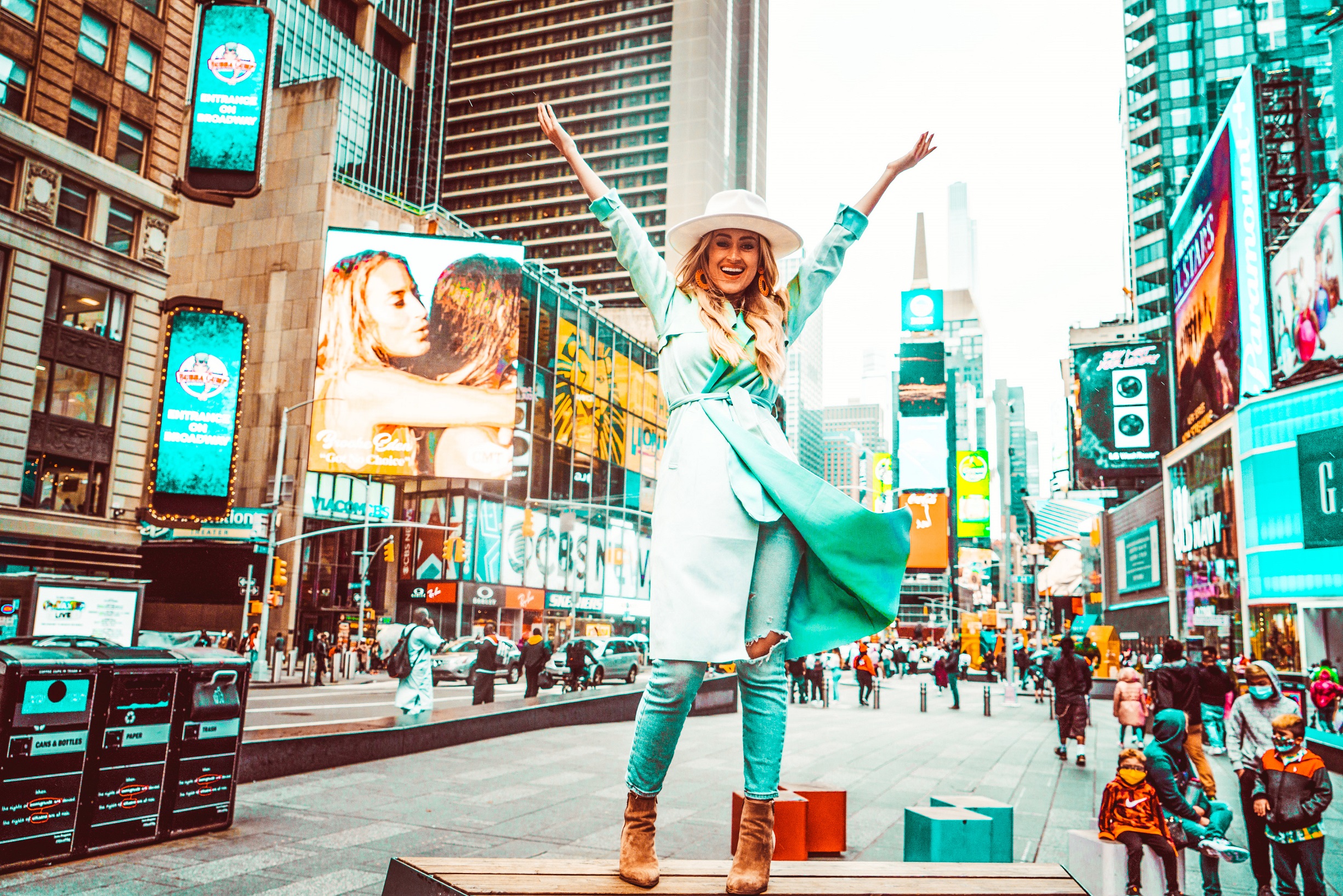“Love has a crazy way of changing your life,” says country singer Brooke Eden. Though the South Floridian pop star on-the-rise has been singing on stages since age five, her new trilogy of music videos mark the first time she has felt truly authentic. Proudly proclaiming her romantic relationship with girlfriend Hilary Hoover, “No Shade,” “Sunroof” and “Got No Choice” show off the pair’s undeniable chemistry.
Sadly, it hasn’t always been this easy for Eden to be herself. After two attempts at competing on American Idol, she embarked on her first radio tour across the United States in 2015. It was during this time that she fell head over boots in love with her girlfriend—but with Hoover’s job as a promotions director for Eden’s record label, their budding relationship was forced to stay hidden. Members of Eden’s music industry team advised her to date a male singer, instead of rocking the boat with conservative fans.
Finally, after three and a half years of hiding in the closet, she was no longer willing to keep their love quiet. As she explains in a Zoom call from her home in Nashville, Eden’s new trilogy of songs have finally set the queer country star free.
I understand you were born into a musical family. Can you tell me about your childhood experiences singing with your dad’s country band?
When I was four years old I went to see my cousin in a production of Annie and came home singing all the songs. My dad, being a musician, was like, “Oh wow, she’s staying on key!” After that my parents started getting me karaoke tracks for Shania Twain songs, and by five years old I was singing with my dad’s band, The Honky Tonks. By the time I was 12, I was opening for Alan Jackson and Brooks & Dunn.
How did you get those opportunities at such a young age?
My dad was very integrated in the local music community. I think there was one show that his band was asked to play, but they already had a gig. He said, “I have a daughter who could do it” and they said, “Sure!” Basically, they were desperate and let 12-year-old me open for Alan Jackson [laughs]. It kind of just snowballed from there.
What was it like auditioning for American Idol and making it as far as you did?
My favourite thing that came out of American Idol was meeting Mickey Guyton. When I was 18, we were standing in line [for the show audition] in Atlanta in the dead of summer. It was so humid that my hair was out to space. My mom was like, “Oh honey, your hair,” and kind of petted my head. Mickey came over and said, “Hey girl, I heard you talking about your hair. I have a straightener in my bag, so I can plug it in and fix that for you.” I just thought, “Wow, what an incredibly nice human!”
Those auditions are way more intense than I thought they would be. There are so many rounds before you see Randy, Simon and Paula [Jackson, Cowell and Abdul, respectively], which is who was judging back then. Mickey and I both made it to Hollywood Week that year, but I ended up not making it beyond that, thank god. I had no idea who the hell I was as an artist. At the time, it was very stressful to have 18- to 19-hour days, but it was also definitely a catalyst that put a fire under my ass. It really showed me that I’m willing to work for this career.
Throughout the early parts of your life, were you attracted to both men and women?
When I was younger, I didn’t see the difference between boys and girls; I just thought whoever you like is who you like. Then I went to a Baptist school for 10 years and learned about what the Bible says and what you’re supposed to do. It never really rubbed right with me. I wondered why we were putting people in corners. In my 20s, I started following my heart and being honest about who I’m falling for, not who people are telling me I should fall for. I dated boys and girls during my 20s until I met Hilary. Then it was done for me. She’s my person, 100 percent. There’s no question about it.
How did you and Hilary first meet?
She was working as my regional radio promoter. We got on a bus and travelled to 160 different country stations around the U.S. Basically you just meet everybody, show them your music and try to connect with them. Hilary was the liaison between my label and the stations. I met her on the first week of the radio tour and we had an instant connection.
I remember the first time she walked on the bus. I guess I was stressed out and exhaled as soon as she got on. That was a weird feeling, but I didn’t think anything else of it. Throughout that week, we had a lot of downtime to talk and learn about each other’s lives. After the first day, I knew she was my soul sister, and this wasn’t how I feel about my friends. Luckily, she felt the same way.
During that first week of the radio tour, my whole life was changing: I was about to embark on this career path that was everything I had worked for my entire life, and at the same time I was falling in love with this girl who works for my record label. All of it was so scandalous! We were trying not to fall for each other, but love has a crazy way of changing your life.
Can you tell me about the people in the industry who told you to keep your relationship hidden?
I don’t really want to single them out, but basically they said, “If you want to keep your career, you have to keep this quiet. You can be in a relationship in your own house, but no posting pictures with her.” Here’s the thing, though: Hilary and I have a chemical connection. People always tell us you can see the chemistry and cut it with a knife. No matter how hard we tried to be platonic, we just had this energy that was obvious.
Eventually it turned into this really weird thing where people were finding out because we just had to be in the same room together. We weren’t telling people, but other people were spreading the word, and it became their story. That was hard because I wanted to be out with her right from the start; I knew she was my person and was done playing this game, but we were scared back into the closet. Once that happened, I became mentally unhealthy.
Three years into our relationship, I decided that I couldn’t pretend to be someone I’m not—especially with this person that I’m so madly in love with. That’s when I went to my label and said, “Y’all, if I ever put out music again I have to be 100 percent myself.” Thankfully, they were like, “Please! We support you in that.” After so much turmoil, it was really nice to have the support of BMG. They not only supported me, but encouraged me to be myself.
Now you’ve gone in completely the opposite direction, releasing three music videos that proudly proclaim your love with Hilary. Do you feel more freedom?
Oh my god! In every single aspect of my life. I write better songs because I’m not afraid of what I’m going to say in the room. I have better relationships with people because I’m not worried about goofing up and saying “she” instead of “he.” I think I’m making my best music right now because I’m able to be myself and be authentic. It feels like another exhale.
Have you heard from queer country fans that have had similar experiences to you?
Every single day. It’s the most beautiful thing to see messages come in like, “I just want you to know that you inspired me to come out to my family. I was met with so much support. Thank you for that little push.”
So much of being queer involves being shamed and told that what you’re doing is wrong. There was a lack of visibility for queer couples in every form of entertainment—TV, movies, music, especially country music—for so long that I think people really felt alone. Now there’s more visibility everywhere. It feels so good to know that my story has helped someone else’s journey.
I know Hilary works for Garth Brooks, so have you spent any time with him? What is he like?
Oh yeah. I opened up for Garth in Oregon a year and a half ago. He’s been so supportive, and so has Tricia Yearwood. Hilary works for both of them, and they’re both amazing. Garth has always been an ally for love, acceptance and inclusion since “We Shall Be Free” in the ’90s. He’s such a cool person to be able to get advice from, and is so sweet and so much fun. Garth’s family at this point.
I had a lot of fun watching his new Netflix documentary. It definitely hammers home the fact that he’s a character.
He really does cry that much in real life! Garth is such an emotional person, which is what makes him so good at what he does, and a wonderful person, too. He’s passionate about everything.
I wanted to ask about the soul-inspired sound of your single, “Sunroof.” Was it your intention to combine different genres?
Yes! I’m obsessed with ’70s soul. When I’m not working and just listening to music (other than country), that’s what I put on. I really wanted to merge those two sounds. Even when I sing, I have a lot of soul in my voice naturally.
I had written with Jesse Frasure on my last single that was on the radio, “Act Like You Don’t.” [Frasure’s] from Detroit, so he’s got that Motown soul running through his veins. [He also DJs under the name Telemitry.] I told him I really wanted to create this sound of soulful retro country, and he was super into that. For the past few years, we’ve been working on this sound that’s uniquely me.
Will the music you’re working on now continue to head in that direction?
Definitely. The backbone of my music is that it’s retro. It will sound modern, like it came out today, but also have influences from retro country, soul and R&B. The throwback sound is what ties it all together.


 Why you can trust Xtra
Why you can trust Xtra


